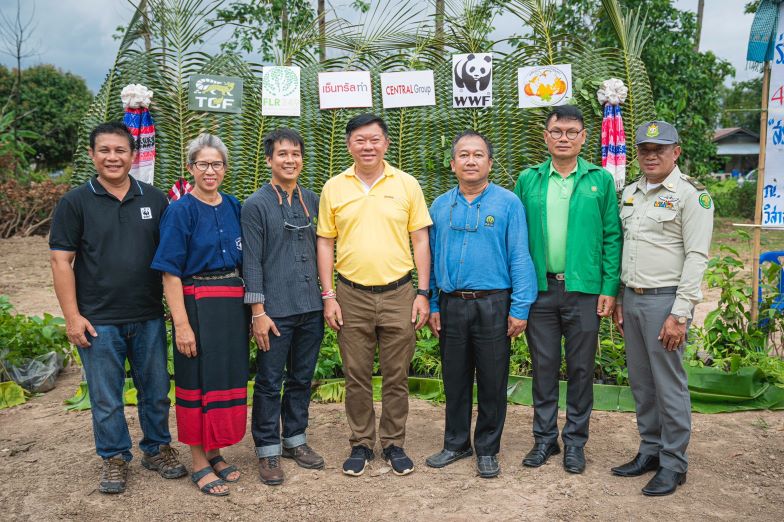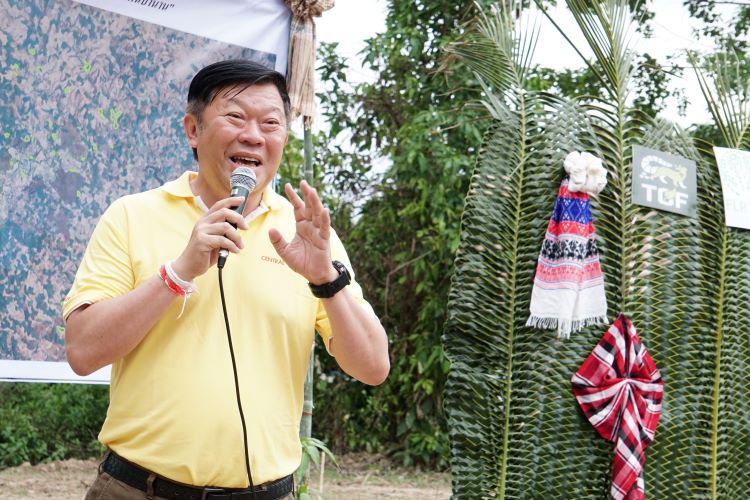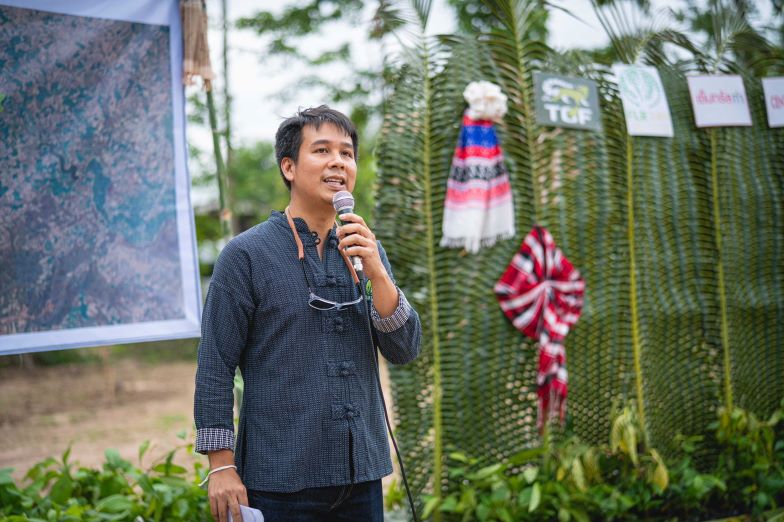The WWF is run at a local level by the following offices...
- WWF Global
- Adria
- Argentina
- Armenia
- AsiaPacific
- Australia
- Austria
- Azerbaijan
- Belgium
- Bhutan
- Bolivia
- Borneo
- Brazil
- Bulgaria
- Cambodia
- Cameroon
- Canada
- Caucasus
- Central African Republic
- Central America
- Chile
- China
- Colombia
- Croatia
- Democratic Republic of the Congo
- Denmark
- Ecuador
- European Policy Office
- Finland
WWF Thailand and partners celebrate success of forest landscape restoration project in Nan Province
09 August 2019
August 9, 2019 Ban Nong Ha Village, Na Noi District, Nan Province:

200 volunteers participated in a tree planting activity to celebrate the success of a forest landscape restoration project with WWF-Thailand, Central Group and the Nan Organic Agricultural Network (NON).
During the event, the results of the first year of a pilot project ‘Sustainable Food System and Forest Restoration in Nan’ -- were announced. Through the innovative FLR349* funding model, 67 smallholder families have shifted from monoculture practices on deforested areas to an integrated farming system covering 257 rai of land as a means to improve the ecosystem, improve livelihoods and protect food security.
Stakeholders participating in the activity today included representatives and volunteers from WWF-Thailand, Central Group, Nan Organic Agricultural Network, Royal Forest Department, Bank of Agriculture and Agricultural Cooperatives, local students, local administrative organisation officers, and academics.
During the event, participants were invited to learn more about the agroforestry and livelihood strategies “Three Forests, Four Benefits” under His Majesty King Bhumibol Adulyadej’s “Sufficiency Economy Philosophy.” Participants also planted perennial trees (mixed forest trees, fruit trees, and economic crops such as cacao) in a mixed system that is sustainable, and which replenishes the soil. Students from local school were included as key stakeholders, joining in the local food-forest education program supported by Central Group. The company also has sponsored the construction of community packing house for organic produces from the project.
“Central Group commits to promote sustainable community livelihoods, and through this project, jobs and new sources of incomes are created,” said Pichai Chirathivat, Executive Director of Central Group. “We are proud to take a part in the sustainable development of Thailand. “Central Tham” is Central Group’s major policy under which we have supported sustainable development projects throughout the 72-years of our business operation. This project “Sustainable Food System and Forest Restoration in Nan” is an example of business collaborations to revitalize our watersheds and forests in Nan, which is fundamental towards sustainability.”

“This model localizes the concept of sustainable consumption and production, which promotes forest restoration and a sustainable food system under the FLR349 programme, said Ply Pirom, SCP project manager at WWF-Thailand. “It has been developed based on collective participation of all sectors. Its funds are derived from donations by the private sector, for example Central Group, and the general public who want to financially support an enterprise for social and environmental causes. They can also help by purchasing the merchandise produced, which is part of an effort to promote sustainable consumption and production patterns. This can offer a solution to the deterioration of natural resources as a result of mono-agriculture in watershed areas.”

The FLR349 Fund will be a flagship model to restore watershed areas and reduce social inequality and food insecurity by applying the King’s Philosophy. It will be based on participation of all sectors and aims to yield collective benefits in line with the UN Sustainable Development Goals. It is hoped that the FLR349 Fund model can be replicated in all areas throughout the country and the world. It is expected that within the first 10 years, the project will be able to develop food production forests covering an area of 50,000 rai and turn a denuded watershed area into a lush and green ecological system to ensure food security on a sustainable basis for future generations.
Note to editor:
To download more information about the FL349 model, visit: http://scp.wwf.or.th/news_stories/?uNewsID=335495
*FLR349 Fund is a fund that has been developed based on the King’s Philosophy of “Three Forests, Four Benefits” and the development of a value chain which could become a model for farmers living in watershed areas. The FLR349 Fund helps farmers turn their agricultural operations from forest-encroaching mono-agriculture with intensive use of chemicals into the “Three Forests, Four Benefits” agricultural system which helps to restore the environment by stopping the destruction of top soil. Farmers learn to grow perennial trees, fruit trees, vegetables and herbs in a mixed system that is sustainable, and which replenishes the soil. Such plantations function like carbon sinks and water reservoirs which make possible the production of diverse and safe foods for consumption. It helps to empower farmers and their community, helps to reduce their living expenses, and helps to keep them healthy. As a result, they can break free from the endless cycle of debt that has trapped many farmers in in our current food system. This system is consistent with the UN Sustainable Development Goals (SDGs).
About World Wide Fund for Nature (WWF)
For nearly 60 years, WWF has been protecting the future of nature.
The world’s leading conservation organization, WWF works in 100 countries and is supported by more than one million members in the United States and close to five million globally. WWF's unique way of working combines global reach with a foundation in science, involves action at every level from local to global, and ensures the delivery of innovative solutions that meet the needs of both people and nature.
For more information, visit: www.panda.org/news
Contact information:
Ms. Duangkamol Wong
Conservation Marketing and Communications Manager
T: 02-618-4303-05 #107
E: Dwongworachan@wwf.or.th

200 volunteers participated in a tree planting activity to celebrate the success of a forest landscape restoration project with WWF-Thailand, Central Group and the Nan Organic Agricultural Network (NON).
During the event, the results of the first year of a pilot project ‘Sustainable Food System and Forest Restoration in Nan’ -- were announced. Through the innovative FLR349* funding model, 67 smallholder families have shifted from monoculture practices on deforested areas to an integrated farming system covering 257 rai of land as a means to improve the ecosystem, improve livelihoods and protect food security.
Stakeholders participating in the activity today included representatives and volunteers from WWF-Thailand, Central Group, Nan Organic Agricultural Network, Royal Forest Department, Bank of Agriculture and Agricultural Cooperatives, local students, local administrative organisation officers, and academics.
During the event, participants were invited to learn more about the agroforestry and livelihood strategies “Three Forests, Four Benefits” under His Majesty King Bhumibol Adulyadej’s “Sufficiency Economy Philosophy.” Participants also planted perennial trees (mixed forest trees, fruit trees, and economic crops such as cacao) in a mixed system that is sustainable, and which replenishes the soil. Students from local school were included as key stakeholders, joining in the local food-forest education program supported by Central Group. The company also has sponsored the construction of community packing house for organic produces from the project.
“Central Group commits to promote sustainable community livelihoods, and through this project, jobs and new sources of incomes are created,” said Pichai Chirathivat, Executive Director of Central Group. “We are proud to take a part in the sustainable development of Thailand. “Central Tham” is Central Group’s major policy under which we have supported sustainable development projects throughout the 72-years of our business operation. This project “Sustainable Food System and Forest Restoration in Nan” is an example of business collaborations to revitalize our watersheds and forests in Nan, which is fundamental towards sustainability.”

“This model localizes the concept of sustainable consumption and production, which promotes forest restoration and a sustainable food system under the FLR349 programme, said Ply Pirom, SCP project manager at WWF-Thailand. “It has been developed based on collective participation of all sectors. Its funds are derived from donations by the private sector, for example Central Group, and the general public who want to financially support an enterprise for social and environmental causes. They can also help by purchasing the merchandise produced, which is part of an effort to promote sustainable consumption and production patterns. This can offer a solution to the deterioration of natural resources as a result of mono-agriculture in watershed areas.”

The FLR349 Fund will be a flagship model to restore watershed areas and reduce social inequality and food insecurity by applying the King’s Philosophy. It will be based on participation of all sectors and aims to yield collective benefits in line with the UN Sustainable Development Goals. It is hoped that the FLR349 Fund model can be replicated in all areas throughout the country and the world. It is expected that within the first 10 years, the project will be able to develop food production forests covering an area of 50,000 rai and turn a denuded watershed area into a lush and green ecological system to ensure food security on a sustainable basis for future generations.
Note to editor:
To download more information about the FL349 model, visit: http://scp.wwf.or.th/news_stories/?uNewsID=335495
*FLR349 Fund is a fund that has been developed based on the King’s Philosophy of “Three Forests, Four Benefits” and the development of a value chain which could become a model for farmers living in watershed areas. The FLR349 Fund helps farmers turn their agricultural operations from forest-encroaching mono-agriculture with intensive use of chemicals into the “Three Forests, Four Benefits” agricultural system which helps to restore the environment by stopping the destruction of top soil. Farmers learn to grow perennial trees, fruit trees, vegetables and herbs in a mixed system that is sustainable, and which replenishes the soil. Such plantations function like carbon sinks and water reservoirs which make possible the production of diverse and safe foods for consumption. It helps to empower farmers and their community, helps to reduce their living expenses, and helps to keep them healthy. As a result, they can break free from the endless cycle of debt that has trapped many farmers in in our current food system. This system is consistent with the UN Sustainable Development Goals (SDGs).
About World Wide Fund for Nature (WWF)
For nearly 60 years, WWF has been protecting the future of nature.
The world’s leading conservation organization, WWF works in 100 countries and is supported by more than one million members in the United States and close to five million globally. WWF's unique way of working combines global reach with a foundation in science, involves action at every level from local to global, and ensures the delivery of innovative solutions that meet the needs of both people and nature.
For more information, visit: www.panda.org/news
Contact information:
Ms. Duangkamol Wong
Conservation Marketing and Communications Manager
T: 02-618-4303-05 #107
E: Dwongworachan@wwf.or.th